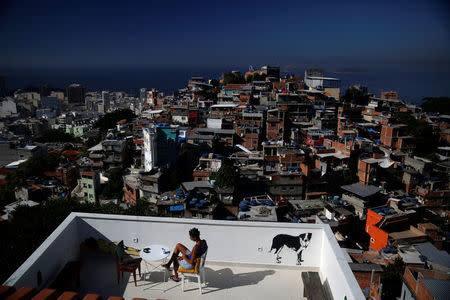Award-winning architect builds 'half houses', says slums should inspire
By Matthew Ponsford LONDON (Thomson Reuters Foundation) - Award-winning Chilean architect Alejandro Aravena wants city governments worldwide to stop fighting urban migration and look to Latin America's sprawling slums as inspiration for new housing. The winner of the 2016 Pritzker, regarded as the Nobel Prize of architecture, Aravena says the vast 'favelas' in cities such as Rio de Janeiro highlight human resilience and the instinctive capacity for home-building. He said if cities are going to successfully absorb the projected 1.5 billion new arrivals predicted by the United Nations over the next 15 years, they must learn lessons from urban slum dwellings. "This is not, even for a second, a kind of romantic look at the favela as a kind of a pre-civilized, paradisic state of living," said Aravena in an interview with the Thomson Reuters Foundation. "Not at all. I mean, the favela is a disaster. But there are forces there that we should be able to channel through design." Aravena is the director of the 15th International Architecture Exhibition of the Venice Biennale, which he will open to the public on Saturday. The exhibition, titled 'Reporting from the Front', has challenged architects from around the world to propose solutions to some of the world's greatest urban problems - from re-building cities ravaged by war to making refugee camps liveable. In contrast with high-profile past directors, dubbed "starchitects" for their showy buildings - Aravena, 48, is best known for designing low-rise social housing for families living in slums. Despite crackdowns, evictions and re-housing programs, an estimated 113 million people across Latin America - or nearly one in five in the region - live in slums. According to the United Nations, about 50 million new homes are needed to address the region's housing shortage. Slum residents have filled gap in state provided housing by building their own homes and connecting them to existing electrical and water grids. These ingenious mini-cities encourage small businesses, including shops, cafes and bars and some even have 'grey market' property traders who buy and sell informal homes. CONCENTRATIONS OF OPPORTUNITY Aravena's architectural practice, Elemental, was praised by the Pritzker Prize jury for its decade-long work consulting with slum dwellers. The architect said his firm's surveys had shown that families value land and location over the size or structure of housing itself. Good land close to employment and opportunities around city centers meant most to residents. "Instead of paying for an extra square meter of built housing space, we found it was much higher on the list of priorities to pay for a well-located square meter of land." Based on U.N. projections of global urban populations, Aravena said architects will need to help build the equivalent of a million-person city every week for the next 15 years - with a budget of just $10,000 per family. But he is optimistic, believing urbanization is intrinsically a good thing. Research by the World Health Organization, he said, shows that health care can be provided most efficiently in concentrated cities. Similar findings show education and public transport can also be improved. "If anything, cities are concentrations of opportunity," he said, "not accumulations of houses". But policies pushing residents into high rise blocks on the edge of big cities have failed the poor, leaving residents segregated from job opportunities and city life, Aravena said. The half empty blocks of high rise on the outskirts of Rio de Janeiro were proof that residents often chose to return to the favelas than negotiate daily, two-hour-plus commutes. A TOOL TO OVERCOME POVERTY Elemental's first major project upgrading slums in Iquique, a coastal city in northern Chile, earned Aravena international attention in 2003. His design involved constructing the concrete shell of a middle class house but filling in only the half the rooms, leaving the other half of the house empty. This unusual design had come from a simple starting point: government subsidies covered construction of a 30 to 40 square meter house while his firm's research showed favela families needed 70 to 80 square meters of space. Families in Iquique, he said, could buy a home for $700 and self-build the remaining half for a few thousand dollars more. The complete house that could later sell for more than $100,000. The house can then become "a tool to overcome poverty", a building that can be used as collateral for a bank loan or finance to start a business. Since Iquique, Elemental has built more than 2,500 low cost houses as well as larger academic and commercial buildings. In April, Aravena made the design for his 'half-houses' available online for free, saying he hoped others would find ways to scale-up construction from a few thousand homes to the necessary millions. The Iquique design kept the slum's original 100 families within the same half hectare of space, and a decade on, all the halves of the houses have been fully built. "It's trying to accept and integrate a (human) force that is so much bigger than 'states' and 'markets' as part of the solution and not just part of the problem," he said. (Reporting by Matthew Ponsford, Editing by Paola Totaro and Ros Russell; Please credit the Thomson Reuters Foundation, the charitable arm of Thomson Reuters, that covers humanitarian news, women's rights, traficking, property rights and climate change. Visit http://news.trust.org)

 Yahoo Finance
Yahoo Finance 



